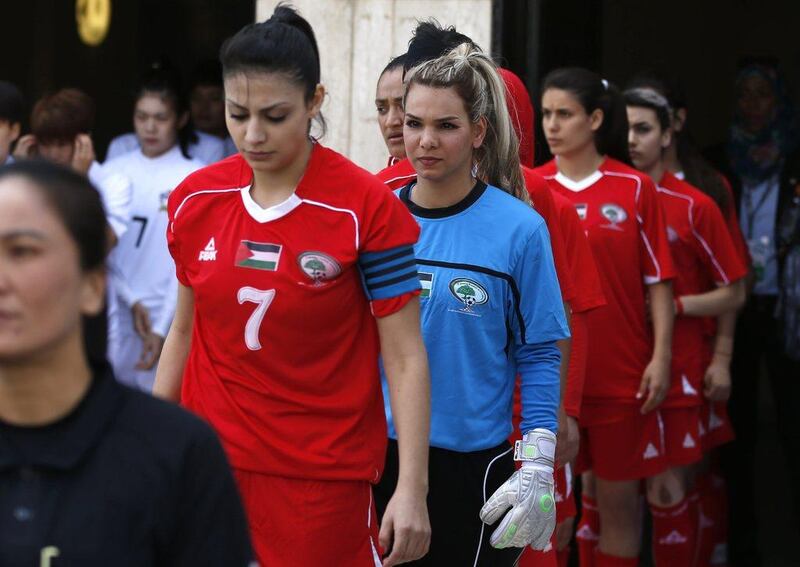The Palestinian women’s football team saw a crushing defeat in their first match in Asian Cup qualifiers — a 6-0 loss to Thailand — but for captain Claudie Salameh, the score means little.
“Playing football for girls in Palestine is an enormous challenge,” she said after the match.
“We face world football but also (challenges) in our country where an outdated vision of girls playing football exists.”
Palestinian women football players have sought to overcome traditional attitudes and the difficulties imposed by Israel’s occupation to build a team now competing in Asian Cup qualifiers.
The other teams in the Asian Cup qualifying group — Thailand and China — have been training together for a long time.
But the members of the Palestinian team were only together for 20 days before their match on Monday in Al-Ram, the Palestinian city cut off from Jerusalem by Israel’s separation wall.
__________________________________
More football
■ On Everton: A once-big club now playing catch up with 'big six'
■ PL Predictions: Tottenham cut Chelsea's lead to four
■ PL Team of the week: The best XI from the last round of matches
__________________________________
“We have to prove to our own people that girls can and know how to play football,” said Salameh while waving her hands expressively, her fingernails painted with flamboyant red polish — the same colour as the Palestinian jerseys.
On Wednesday, they will play their second cup qualifier against China as part of their aim to reach the 2018 tournament to be held in neighbouring Jordan.
The two other countries meant to be in the group — Lebanon and Guam — have withdrawn.
Palestinian women’s football has existed in organised form for less than 10 years.
The first team was formed in 2009 with little financial support and controversy over women playing what is seen by some as a man’s game in shorts.
There are now four teams playing outdoors and about a dozen indoors. About 400 girls over 14 are registered as players.
The players face both “cultural obstacles” and, like all Palestinians, those imposed by the Israeli army due to the 50-year occupation of the West Bank, said Hanadi Nasser Eldin, head of women’s football for the Palestinian federation.
Receiving permission from the Israeli authorities for players to travel as well as for equipment to be transported are issues that have been looked at by Fifa.
But on a more personal level, due to traditional attitudes, the players are subjected to debates over their clothes and the pursuit of sporting activity past the age when some believe they should be married.
The subject has come up at sermons in some mosques.
In the Gaza Strip, the other Palestinian territory separated from the West Bank by Israel and run by Islamist movement Hamas, only a small number of girls play indoor football.
Members of the Palestinian national team come from the West Bank or Arab Israeli communities.
Beyond trying to win, a major challenge for the players is building a programme and making their presence known.
Riham Al-Moghrabi, around 20, was one of the rare fans taking in Monday’s game at the Faisal Al-Husseini stadium — the only international Palestinian football venue.
Having travelled from the West Bank city of Jericho, she said she felt the players had “a strength, a will and a gift that can both serve them and the whole country”.
“Playing football for girls is not something to be ashamed of or a sin,” she said.
Jibril Rajoub, head of the Palestinian Football Federation, has been working to bring Palestinian teams — as well as the flag, anthem and cause — to all international sporting events.
The federation works not only on training players and coaches, but “also for rules guaranteeing the place of women — half of society — in this sporting revolution,” he said.
* Agence France-Presse
Follow us on Twitter @NatSportUAE
Like us on Facebook at facebook.com/TheNationalSport





